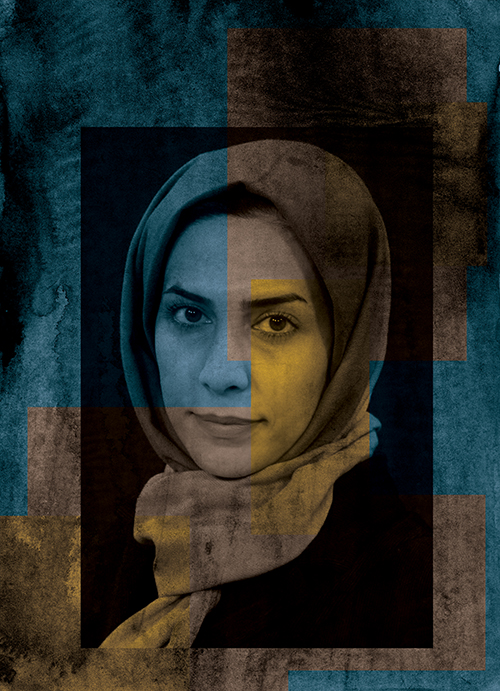Afghanistan: Somaya Ramesh: "Things will get worse if the government sacrifices human rights for political interests"
| Publisher | International Federation for Human Rights |
| Publication Date | 1 April 2014 |
| Cite as | International Federation for Human Rights, Afghanistan: Somaya Ramesh: "Things will get worse if the government sacrifices human rights for political interests", 1 April 2014, available at: https://www.refworld.org/docid/534bd8f45.html [accessed 7 June 2023] |
| Disclaimer | This is not a UNHCR publication. UNHCR is not responsible for, nor does it necessarily endorse, its content. Any views expressed are solely those of the author or publisher and do not necessarily reflect those of UNHCR, the United Nations or its Member States. |
Latest update: 1 April 2014
Somaya Ramesh is the director of the Nawandishan Social and Cultural Foundation and an independent candidate in the provincial council's elections in Herat.
 Photo by Firouz Mashouf / Matthieu Hackière
Photo by Firouz Mashouf / Matthieu Hackière
Have you experienced violations of your human rights in Afghanistan?
Life in a traditional society like Afghanistan, in particular for women, is never free from violations of human rights. As soon as I step out of my house, I face violence and human rights violations. The society humiliates and threatens you in its actions, attitudes, speech, and looks. People regard you with hostility.
What are the important achievements since the fall of the Taliban in Afghanistan?
One of the achievements is the arrival of relative security and peace. With respect to women, despite all of the dissatisfaction, it is a great achievement that women have been able to be stand side-by-side with men on various political and social stages. The other major achievement is the emergence of the media and freedom of expression.
What gives you hope for the future?
On the whole, Afghanistan's transition to political and social democracy has not been fully convincing. However, the fact that the present system has remained intact and the government has not disintegrated from within, that the various institutions, non-governmental organisations and civil society have been active and achieved progress – all of these developments are promising and have built confidence.
What is your worst fear today?
My biggest fear is that the Taliban might return to political power; that they could once again overshadow our fate.
What are the biggest challenges Afghanistan faces?
It is difficult for democracy to develop in Afghanistan. We still live in a society that is strongly rooted to its tribal and traditional origins. In my opinion, the modern democratic system has very little in common with the tribal society. This has led to confusion and disappointment as we try to move towards democracy but get held back by tradition.
Another challenge is that the patriarchal society does not want to acknowledge women's identity; in fact, it strongly resists it. There are also the problems of ethnic tension and fundamentalism. Most of our problems originate from the persistent tribal, fundamentalist mentality.
Is it possible that girls could once again be banned from schools and women excluded from social participation, as was the case under the Taliban?
Things will get worse if the government sacrifices human rights for political interests. I am worried that the government will approach the problem of the Taliban from an angle of 'brotherhood' and expediency. Then, it's quite likely this scenario could recur.
Can you give us an example of a rights violation experienced by a woman you know?
I visited a friend of mine a few days ago and noticed that she was quite tired and depressed. I asked her what was wrong. She told me that her family will not allow her to continue studying. These situations arise too frequently for women in Afghanistan.
Which factors deter women from participating in social, economic, political and cultural spheres?
Patriarchy and the power of the elders. Also, women are limited by their own lack of knowledge and awareness about the rights and privileges they are entitled to under the law.
Which sources and centres of power can women rely on to promote their rights and demands?
There are many symbolic sources and institutions which promote women's rights and demands. But in reality, very few of these sources mean anything in a tangible sense. For example, women are entitled to many civil rights under the present system and its laws. The Afghanistan Independent Human Rights Commission has a mandate to protect and defend women's rights. The problem, however, is that there are no guarantees for any of these mechanisms.
What do you wish for your daughter?
I never wished to have a daughter, but if I do have one, I wish that she will enjoy all her rights and be treated as a human being.
What have you done in your personal and professional life to fight against discrimination?
In my private life, I have always behaved in such a way that the members of my family and my relatives would know that I support them. Publicly, I have worked in different centres. In my own Foundation, I have tried to do everything to promote and defend women's rights, for example, by holding meetings, roundtable discussions, conducting interviews, publishing articles, books and magazines. We have organised educational courses on the rights, responsibilities, and status of women. We organised the first Women's Book Fair in Herat.
Any final messages you wish to share?
We are on the eve of the elections. I ask all the people of Afghanistan to take part in the elections and to decide their own fate.
"Unveiling Afghanistan, the Unheard Voices of Progress" is a campaign by Armanshahr/OPEN ASIA and FIDH, which explores views held by Afghan civil society actors. Over 50 days, 50 influential social, political, and cultural actors hope to spark conversation and debate about building a society that is inclusive of women's and human rights in Afghanistan.
